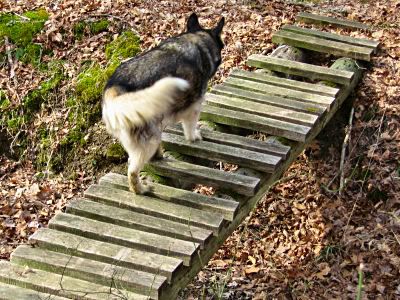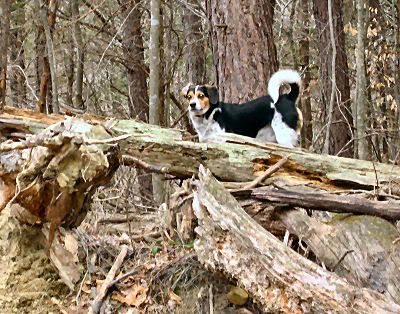My appologies for not keeping up with the dog blog of late.
I’ve recently been appointed editor for Green Tasmania Magazine (the magazine of the Tasmanian Greens party) and since we (Tasmania) have an election coming up in a week and a half, I’ve been frantically putting together an “election special issue.” Luna has been feeling the neglect as well.

Good thing there are old towels to keep her somewhat occupied.
On the flip, I’ve posted my first editorial for the magazine.
Un-Supersize me
The MacDonalds® business model is simple. Step 1) make a low value product with a small profit margin and then sell billions of them. Step 2) minimise costs by simplifying and mechanize the process to the greatest degree so that workers can’t move their way up the pay ladder through acquiring more knowledge and skills, thus keeping your labor plentiful and cheap.
There are, of course, a few more intricacies involved. Like getting the government to subsidize the whole supply chain and workers’ salaries through farm subsidies, road and infrastructure building and maintenance, and “worker employment and training” schemes. Then, as a matter of policy, constantly squeeze suppliers and sub-contractors, forcing them to keep lowering their costs, or lose their contract. Costs such as their workers’ salaries. And, because money `invested’ on political lobbying has such a high rate of `return’, spend even more money on convincing politicians that you need even more subsidies and to pay even less for public resources (i.e. those pesky taxes). Add to this the costs of pollution and unsustainable practices, and you get a perfect example of privatizing profits through socializing losses.
Some `free-market’ types tout this model as the pinnacle of `business evolution’, because of how completely it seems to have decimated `the competition’. But Social Darwinism always ignores the reality of social promotion – i.e. what gets ahead does so largely because it is deliberately helped ahead by structures under human control. Structures such as the laws that govern employee/employer relationships, taxation, and most importantly, articles of incorporation. Corporations are fictions, given their rights and responsibilities, and indeed their very existence, by our governments. They exist at our pleasure, and for our benefit, not, as so many of our politicians seem to have forgotten, the other way around. That’s just as true in Australia and Tasmania as it is in the good old US of A.
The attraction of this business model is clear: executives have such a large base to skim that they can award themselves huge salaries and still manage to pay a reasonable rate of return to stock holders. Since executives make most business decisions, it’s not hard to see why so many industries have followed the MacDonalds® model.
Industries like wood chipping, for example. Trees don’t have to be made into chips, any more than beef has to be made into cheap burgers. And while there is a place for low-skilled entry-level jobs, they shouldn’t be allowed, much less encouraged by our government, to lead nowhere or to become a greater and greater proportion of our job market.
The main difference between the low-value/high-volume markets and higher-value/lower-volume markets is the need for skilled workers. Workers who can usually demand a decent wage in exchange for their abilities. From the same material inputs, come vastly differing outcomes. A choice made by the governments we vote for.
Plenty of businesses are good corporate citizens. They create good products while paying decent salaries, and are working to eliminate their impact on the environment, or even help reverse our collective environmental debt. Australian solar research and technology used to lead the world, but now our solar businesses get offers from Texas and California, but can’t get the Howard Government to show any interest, much less provide industry support. Even BP, one of the largest makers of solar panels, could not get the Howard Government to support the industry by expanding Australia’s renewable energy market, and as a result, BP may yet have to close down its Australian plant that employs several hundred people.
At the same time as our solar companies are getting left out in the cold, corporations that own the rights to mine Australia’s brown coal, the worst greenhouse gas producer of all time, have had no difficulty in securing the promise of additional brown coal- fired electrical generating stations. We clearly should be converting the ones we already have, not building more.
This is classic example of “Looking out for the BIG GUY” so favoured by both Liberal and Labor. Howard sold his Industrial Deform as being based on flexibility – ours, obviously – not industry’s. We have to keep on-our-toes whichever way the global industrial winds might blow. But big businesses can be as unyielding and as backward as they want, with the government’s support and blessing.
Lennon has promised us, in typical big project fashon, he’ll see a billion dollar pulp mill built, locking in us in to the low-skill, low-value woodchip industry. All I see are two plastic golden arches casting a perpetual shadow across our future.
Tasmania’s great fortune in unique hardwood trees and fine agricultural soils could be providing good salaries to skilled workers. As could industries making both tried-and-true and innovative energy efficient and renewable energy products. It’s not too hyperbolic to say that we could be an Island of artisans. Giving people, both tourists and workers, yet one more reason to come here. Other places, especially islands, have done it – with the support of their government.



I’m ignoring the excellent, well-written editorial because I am shallow and crass and want dogs and rabbits and ducks and frogs. More Luna please and how is Albert?
Giddy proves how adaptable dogs are.

Sniff plays king of the
stumps.

Here’s some of the ducks.
That’s “Boogie Shoes” looking back at the camera.
Here was the big guy this past weekend
…and somebody clearly needed a nap after playing hard for five minutes
There’s nothing in this world that can look sadder than a hound’s face. Bud would look much happier, though, if you would bring him to Thursday Dog Blogging more often.
But we don’t want to tire him out too much — after all he needs to gear up for Bud Blogging
Albert is fine.
Although he’s still a bit miffed that napping has yet to be elevated to an Olympic sport. He’d be in the medals, that’s for sure.
He could always go in for curling — it’s almost the same thing.
(And thanks for the pic — I have a crush on Albert.)
a rabbit when I was a little kid, but my parents would never allow it. They finally caved and got me my first dog after constant nagging. Max was a great pal, but I still have a warm spot for bunnies.
Not much you can say to this one, really.
This is one of my favorite photos of Albert and Oscar. Taken about two years back, when we first got Albert and Oscar still wasn’t sure what to do with this little critter following him around and snuggling up with him. We all miss Oscar, but none so much as Albert.
Thanks for the Albert pics but especially for this one.
Keres
I’m afraid I haven’t been paying proper attention lately – too much going on at work and home. What is going to happen in the Tasmanian election? How will the Greens treat a situation where neither ‘major’ party has a majority?
In solidarity
Hi CB. It does look like the Tas Greens might be in a position to form a minority coalition government with the Labor party. If, as predicted, we pick a seat and they lose their majority.
Which would catapult us into a position with real bargaining power. Not bad for “fringe” group in a sleepy little back-water state.
Here’s the article from Green Tasmania about “balance of power.”
Hmmmn… So Green support for a minority government, or would it be a coalition?
got home late & too tired to log out Keres.
I would slightly disagree with Keres putting it forward as a likely otucome being a Lib-Green coalition of some kind – the Libs have point blank refused to deal with the Greens,
Basically we don’t know what’s going to happen, except that Labor look certain to lose their majority, and the Libs don’t look like picking up very many seats.
The Greens’ position is simple, if we hold the balance of power, we’ll use it responsibly. Our preference would be for a mature political solution, such as a coalition with party members sharing portfolios, as happens in many European countries. I reckon te chances of either Labor or Liberal agreeing to that are a snowflake’s chance in hell.
So my prediction is pretty straight-forward: if there’s a hung parliament situation, almost certainly both the major parties will refuse to deal with the Greens to form a majority coalition. It’s much more likely that whichever of the Libs or Labs holds the larger minority will form a minority gov’t and the Greens will sit on the cross-benches as before, and we’ll see some serious legitimacy given to policy making decisions in Tas parliament for a while.
Of course the catch is that because the Laborials conspired to do a hatchet job on Tas’ electoral system to try and wipe out the Greens – a minority gove’t means no backbench! Every single elected party rep would have to be a cabinet minister – and believe me when I say we don’t have the depth of talent in Tas politics to make this a good outcome.
As usual the major parties shot themselves in the foot for short-term political gain.